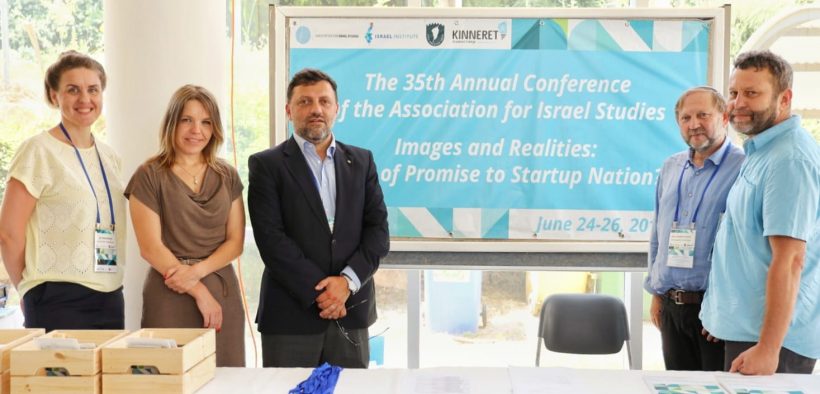Institute executive board at the 35th Annual Conference of the Association for Israel Studies
Поделиться

Photo: Erez Biton Photography
At the 35th Annual Conference of the Association for Israel Studies, one of the leading Israeli experts on the Israeli Russian-speaking community prof. Zeev Khanin concisely summarized the key findings of multiple studies regarding the Russian-speaking Israeli citizens.
Reviewing comprehensive studies over the last nine years, Prof. Ze’ev Khanin emphasized that the key expectations of the Russian-speaking Israelis from national leaders are similar to those of the rest of the Israeli citizens.
National security issues concern 50% to almost 90% of the community over recent years. Among the leading socio-economic issues that particularly concern the Russian-speaking citizens are solving the housing problem of young couples, lowering retail prices, deregulation of the economy, and improvement of formal education.
At the same time, almost a third of Russian-speaking olim (more than 60% among the elders) recognize many problems specific for the members of the community. Almost 45% and more among the middle-aged believe such problems are limited while only about a quarter, mainly young people, believed that “Russian-speaking Israelis have the same problems as others.”
“It seems that the very notion of “Russian interests” in communal discourse in recent years has been transformed from a simple interaction into a more organic combination of a nationwide and a specific community agenda”,- said Prof. Ze’ev Khanin during the panel chaired by Dr. Haim Ben-Ya’akov, Director General of the Euro-Asian Jewish Congress.
Since 1989, around 1.1 million Russian-speaking olim arrived in Israel while till now around half of them feel some degree of personal belonging to the Israeli “Russian” community at any age.
All in all, as quoted studies show, in terms of understanding basic state and society issues, as well as relations of Israel with Russia and other FSU countries, the “Russian” Israeli community is rather a product of the local experience than of the Soviet and post-Soviet legacy.
The panel “The Russian-Jewish Diaspora at the Shadow of Russian-Israeli Relations” at the 35th Annual Conference of the Association for Israel Studies is organized by the Institute for Euro-Asian Jewish Studies and sponsored by the Euro-Asian Jewish Congress. The panel participants:
Prof. Vladimir (Ze’ev) Khanin is the Academic Chairman of the Institute for Euro-Asian Jewish Studies (IEAJS), founded by the Euro-Asian Jewish Congress and lectures Israel, Jewish and Political studies at Ariel University and Bar-Ilan University.
Vladimir Chernin, Director of Publishing Projects at the Institute for Euro-Asian Jewish Studies (IEAJS) and Yiddish language and culture lecturer at the Ariel University: Between Diaspora Identity and Identification with the Jewish State: Russian Jewish Literature in Israel.
Jennifer Shkabatur, Interdisciplinary Center (IDC) Herzliya: The Mirror of Social Media: Identity and Politics Among the Russian Diaspora.



